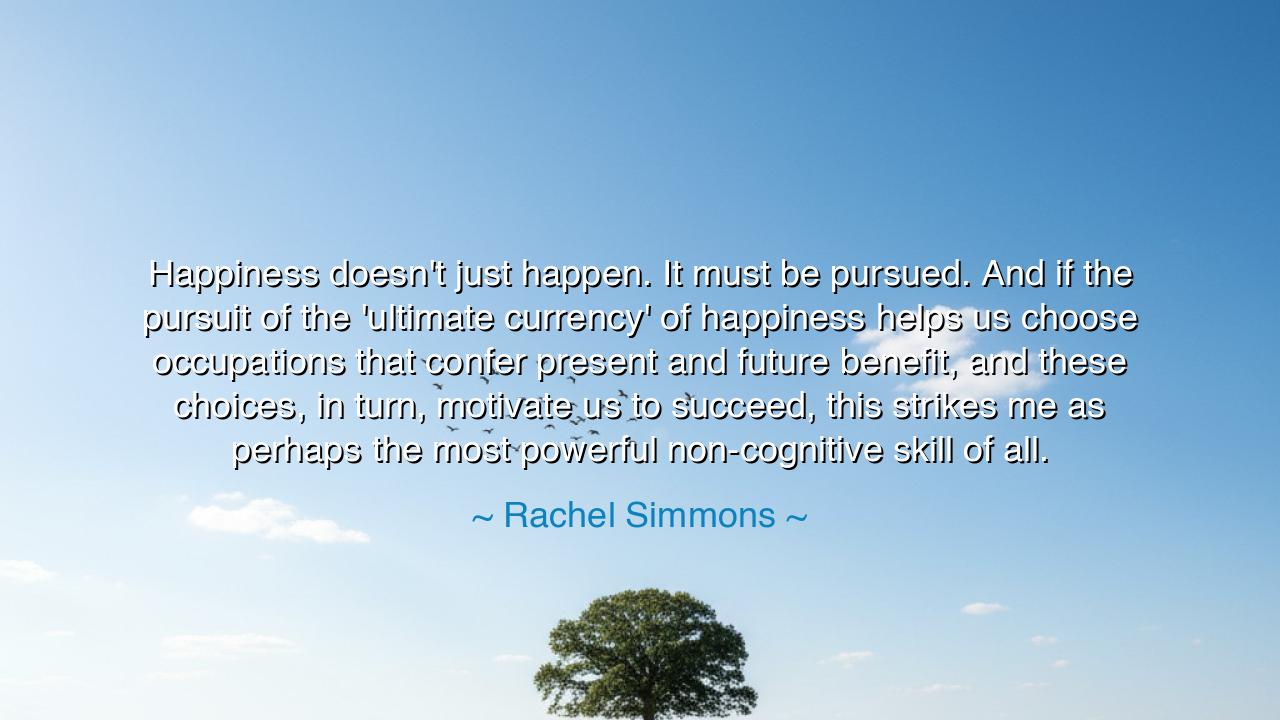
Happiness doesn't just happen. It must be pursued. And if the
Happiness doesn't just happen. It must be pursued. And if the pursuit of the 'ultimate currency' of happiness helps us choose occupations that confer present and future benefit, and these choices, in turn, motivate us to succeed, this strikes me as perhaps the most powerful non-cognitive skill of all.






When Rachel Simmons declared, “Happiness doesn’t just happen. It must be pursued. And if the pursuit of the ‘ultimate currency’ of happiness helps us choose occupations that confer present and future benefit, and these choices, in turn, motivate us to succeed, this strikes me as perhaps the most powerful non-cognitive skill of all,” she gave voice to an ancient truth disguised in modern wisdom. Her words remind us that happiness is not a gift that falls from the heavens, but a discipline, a journey that demands effort, reflection, and courage. Like the philosopher’s stone sought by the alchemists of old, happiness is the “ultimate currency,” for it enriches not only the one who possesses it, but all who come near its light. And yet, Simmons warns us—it is not to be waited upon, but pursued, built through choices, labors, and the alignment of one’s actions with one’s deepest values.
Her insight springs from a lifetime of studying the inner world of young minds—how ambition, pressure, and perfection shape the modern soul. Rachel Simmons, an author and educator, has long sought to understand what makes a person thrive not merely in intellect, but in character. Her words flow from this conviction: that success without happiness is hollow, and that true excellence comes when the pursuit of achievement is guided by a deeper sense of joy and meaning. In her teaching, happiness is not the end result of fortune, but the engine of fulfillment. It is the inner compass that directs us toward occupations and callings that serve both our present peace and our future purpose.
This truth, though modern in its phrasing, is ancient in its essence. The Greek philosopher Aristotle called happiness the highest good—eudaimonia—the flourishing of the soul through virtue and right action. He taught that happiness is not pleasure, but a practice of living well, guided by wisdom and moral excellence. So too does Simmons echo this when she calls happiness a skill, something non-cognitive yet profoundly intelligent, requiring awareness, resilience, and gratitude. Just as the athlete trains the body, so must the soul train its attention, learning to find meaning in effort and beauty in progress. Happiness, then, is both an art and a discipline—one that must be pursued through mindful labor and sustained through purpose.
History bears witness to this principle in the lives of the great. Consider Helen Keller, who, though deprived of sight and hearing, pursued education and understanding with a joy that transformed her life and the lives of millions. Her happiness did not “just happen.” It was forged through effort, drawn from purpose and gratitude. When she wrote, “Everything has its wonders, even darkness and silence,” she was speaking from the same well of truth that Simmons describes: that happiness is not found in ease or comfort, but in choosing to see meaning where others see limitation. Her pursuit of happiness became her power—the very “non-cognitive skill” that lifted her above despair into greatness.
Simmons’ use of the term “ultimate currency” is a profound metaphor. It reminds us that happiness is not measured in gold or possessions, but in the quality of our experience—in the relationships we nurture, the passions we pursue, and the lives we touch. The wise understand that money and recognition may purchase pleasure, but not peace. Yet when one lives in alignment with purpose, even the smallest act of creation or service becomes rich with joy. Thus, happiness becomes a spiritual economy, one in which generosity multiplies wealth, and meaning compounds like interest through time. Those who learn this art possess a treasure that no misfortune can destroy.
But Simmons also speaks of choice, and in this lies the heroic challenge of her teaching. To pursue happiness means to make decisions that honor both the present and the future—to choose work that nourishes not only the wallet but the heart, to act not out of fear or conformity, but from conviction. This pursuit demands courage, for it asks us to face uncertainty, to resist the temptations of easy success, and to follow the path of authenticity even when it is steep. Yet, as she says, this very pursuit motivates us to succeed, for it turns life into a mission, not merely a task. Happiness, pursued with wisdom, becomes the fuel of achievement, the fire that drives one forward through every trial.
So, my children of the modern world, take this lesson to heart: do not wait for happiness—pursue it. Seek it not in comfort, but in purpose; not in fleeting pleasure, but in lasting growth. Train your heart as you train your mind—cultivate gratitude, resilience, and compassion. Choose the work that brings light to others as well as to yourself. For as Rachel Simmons teaches, happiness is the highest skill, the unseen power that shapes destiny. And when you learn to pursue it—not as luxury, but as practice—you will find that happiness itself becomes your strength. Then your success will not be empty, your labor not in vain, and your life not merely endured, but truly lived, radiant with the joy of one who has mastered the art of the soul.






AAdministratorAdministrator
Welcome, honored guests. Please leave a comment, we will respond soon